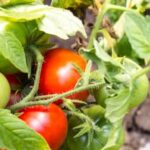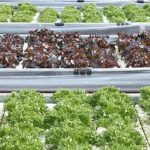Are you wondering, “is diatomaceous earth good for vegetable gardens“? Many gardeners are discovering the benefits of using diatomaceous earth in their vegetable gardens. This natural product has been gaining popularity for its effectiveness in controlling pests and improving soil health.
Diatomaceous earth is a naturally occurring sedimentary rock that is made up of the fossilized remains of tiny, aquatic organisms called diatoms. When ground into a fine powder, it can be used to control pests and improve the overall health of vegetable gardens.
In this article, we will explore what diatomaceous earth is, how it works, its benefits in vegetable gardens, application methods, common misconceptions, safety precautions, tips for choosing the right product, and real success stories from gardeners who have used it in their own vegetable gardens. Whether you are a seasoned gardener or just starting out, understanding the potential benefits of diatomaceous earth could make a significant difference in the success of your vegetable garden.
Understanding Diatomaceous Earth
Diatomaceous Earth (DE) is a naturally occurring, soft, siliceous sedimentary rock that is easily crumbled into a fine white to off-white powder. It is commonly used as a natural insecticide in vegetable gardens due to its abrasive properties and ability to absorb lipids from the waxy outer layer of insects’ exoskeletons, causing them to dehydrate.
This natural product is made up of the fossilized remains of ancient aquatic diatoms. These diatoms are single-celled algae that have an outer shell composed of silicon dioxide, or silica. When these diatoms die, their shells accumulate on the bottom of bodies of water and eventually form deposits that can be mined.
When it comes to vegetable gardens, diatomaceous earth has proven to be an effective pest control method against a variety of garden pests such as aphids, thrips, mites, snails, and slugs. It is also known for its ability to control parasites in soil which can cause harm to vegetable plants. Not only does it work effectively against common garden pests, but it also has low toxicity to humans and animals when used as directed.
| Benefits | Details |
|---|---|
| Natural Insecticide | Effective pest control method against aphids, thrips, mites, snails, and slugs. |
| Low Toxicity | Safe for humans and animals when used as directed. |
| Control Parasites | Able to control parasites in soil that can cause harm to vegetable plants. |
Benefits of Using Diatomaceous Earth in Vegetable Gardens
Diatomaceous earth is an excellent natural product that is commonly used in vegetable gardens for a variety of reasons. One of the key benefits of using diatomaceous earth in vegetable gardens is its effectiveness as a natural insecticide. The fine powder works by abrading the exoskeletons of insects, ultimately leading to dehydration and death. This makes it an ideal solution for controlling common pests such as aphids, beetles, caterpillars, and mites without the use of harmful chemicals.
In addition to its role as an insecticide, diatomaceous earth also has the ability to control fungal diseases in vegetable plants. The substance creates an environment that is inhospitable to fungi by absorbing moisture and providing a barrier against the spread of spores. This can help prevent common fungal issues such as powdery mildew and damping off, promoting healthier plants and higher yields in the garden.
Furthermore, diatomaceous earth is known for its ability to improve soil health in vegetable gardens. When incorporated into the soil, it helps to increase porosity and drainage while also enhancing nutrient retention. This can lead to better root development, improved plant growth, and ultimately higher-quality vegetables.
| Benefit | Description |
|---|---|
| Natural Insecticide | Diatomaceous earth abrades insects’ exoskeletons, leading to dehydration and death. |
| Fungal Disease Control | The substance absorbs moisture and provides a barrier against the spread of spores, preventing common fungal issues. |
| Improves Soil Health | It increases porosity and drainage while enhancing nutrient retention, leading to better plant growth. |
Application of Diatomaceous Earth in Vegetable Gardens
Diatomaceous earth is a natural and effective way to control pests in vegetable gardens. It can be applied in various ways to provide protection for your plants while avoiding the use of harmful chemicals. Here are some common methods for using diatomaceous earth in vegetable gardens:
- Dusting: One of the most common ways to apply diatomaceous earth is by dusting it onto the foliage and soil around your plants. This can help to deter crawling insects such as slugs, snails, and ants.
- Soil amendment: Mixing diatomaceous earth into the soil can help improve drainage and prevent fungal growth. It also provides long-lasting protection against certain pests that live in the soil, such as cutworms and root maggots.
- Seed storage: Sprinkling a small amount of diatomaceous earth in containers or bags where you store seeds can help prevent infestations from insects that may damage or eat the seeds.
When applying diatomaceous earth in your vegetable garden, it is important to consider its potential impact on beneficial insects such as bees and butterflies. Avoid applying it to flowers when they are blooming, as this could inadvertently harm pollinators.
In addition, reapplication of diatomaceous earth may be necessary after heavy rain or irrigation, as it can become less effective when wet. Following these application tips can ensure that you make the most of this natural pest control method in your vegetable garden.
Common Misconceptions About Diatomaceous Earth
There are several common misconceptions about diatomaceous earth that often lead to confusion among vegetable gardeners. Understanding the truth behind these myths is essential for reaping the benefits of this natural product in your garden.
One common misconception is that diatomaceous earth kills beneficial insects along with pests. In reality, while it can be harmful to some insects, it primarily targets pests with exoskeletons such as ants, beetles, and caterpillars. Beneficial insects like ladybugs, bees, and earthworms are generally not affected by diatomaceous earth when used properly.
Another misconception is that diatomaceous earth works instantly. While it is effective in the long run, it does not provide immediate results. This can lead some gardeners to believe that it is not working, leading them to abandon its use prematurely.
Finally, some people believe that all diatomaceous earth products are the same. However, there are different grades of diatomaceous earth available on the market. Food grade diatomaceous earth is safe for use in vegetable gardens, while pool grade diatomaceous earth contains higher levels of crystalline silica and should not be used in gardens.
In order to make an informed decision about using diatomaceous earth in your vegetable garden, it’s important to understand these common misconceptions and seek out accurate information about its application and benefits.
Safety Precautions When Using Diatomaceous Earth in Vegetable Gardens
Protective Gear
When using diatomaceous earth in your vegetable garden, it’s important to prioritize your safety. This substance can be harmful if it comes into contact with your skin or eyes, so it’s crucial to wear protective gear such as gloves, goggles, and a mask when handling diatomaceous earth. This will help to prevent any accidental contact and inhalation of the particles, ensuring that you can work with the substance safely.
Application Techniques
To minimize the potential risks associated with diatomaceous earth, it’s essential to use appropriate application techniques. Avoid creating dust clouds when applying the substance by using a duster or other application tool that allows for controlled dispersal. Additionally, make sure to apply diatomaceous earth on calm days to prevent wind from carrying the particles into unwanted areas. By using these proper application techniques, you can reduce the likelihood of coming into direct contact with the substance.
Storage and Disposal
Proper storage and disposal of diatomaceous earth is also important for maintaining safety in your vegetable garden. Store the substance in a secure container away from moisture and humidity to prevent clumping and preserve its effectiveness.
When disposing of unused portions or empty containers, follow local regulations for hazardous waste disposal to ensure that diatomaceous earth does not pose an environmental risk. By handling storage and disposal responsibly, you can safeguard both yourself and the surrounding environment from potential harm associated with diatomaceous earth.
By taking these safety precautions when using diatomaceous earth in your vegetable garden, you can enjoy its benefits while minimizing any potential risks to yourself or others.
Tips for Choosing the Right Diatomaceous Earth for Your Vegetable Garden
When it comes to choosing the right diatomaceous earth for your vegetable garden, there are a few important factors to consider. The quality of the diatomaceous earth and its specific properties can make a big difference in its effectiveness in your garden. Here are some tips for choosing the right diatomaceous earth for your vegetable garden.
Food Grade vs. Pool Grade Diatomaceous Earth
One of the most important factors to consider when choosing diatomaceous earth for your vegetable garden is whether to use food grade or pool grade. Food grade diatomaceous earth is safe to use around plants and animals, making it the best choice for your vegetable garden. On the other hand, pool grade diatomaceous earth is chemically treated and may contain harmful additives that could be detrimental to your garden.
Particle Size
The particle size of diatomaceous earth can also affect its performance in your vegetable garden. Finer particles are more effective at controlling pests, as they have a larger surface area to absorb the oils and fats from insects’ exoskeletons, ultimately causing them to dehydrate and die.
Sourcing From Reputable Brands
It’s important to source diatomaceous earth from reputable brands that offer high-quality products. Look for certifications or endorsements from organic gardening associations or reputable agricultural organizations. This will ensure that you are getting a reliable product that will be beneficial for your vegetable garden.
By considering these factors and doing thorough research on different brands and types of diatomaceous earth, you can choose the right one for your vegetable garden and reap the benefits it offers in terms of pest control and overall plant health.
Success Stories
In conclusion, the use of diatomaceous earth in vegetable gardens has proven to be a successful and beneficial choice for many gardeners. The natural properties of diatomaceous earth make it an effective tool for managing pests, improving soil health, and ultimately increasing the yield of vegetables. This organic and environmentally friendly option is gaining popularity as more gardeners experience positive results in their own gardens.
Many success stories have been shared by gardeners who have incorporated diatomaceous earth into their vegetable gardens. They have reported a significant reduction in pest infestations, healthier plants, and a bountiful harvest. These firsthand experiences serve as a testament to the effectiveness of diatomaceous earth in promoting the overall well-being of vegetable gardens.
It’s important to note that while diatomaceous earth is indeed good for vegetable gardens, it’s crucial to select the right type for your specific needs. Additionally, following safety precautions when applying diatomaceous earth is vital to ensure its proper use without any potential harm to humans, pets, or beneficial insects. Overall, with proper application and attention to safety measures, using diatomaceous earth can lead to successful outcomes in vegetable gardens.
Frequently Asked Questions
How Do You Use Diatomaceous Earth on a Vegetable Garden?
Diatomaceous earth can be used on a vegetable garden by lightly sprinkling it on the soil around the plants or directly on the leaves to control pests. It should be reapplied after rain or watering.
Is Diatomaceous Earth Safe for Tomato Plants?
Diatomaceous earth is generally safe for tomato plants, as long as it is applied correctly and in moderation. It can be effective in controlling pests like slugs, snails, and caterpillars that commonly affect tomato plants.
What Are the Downsides of Diatomaceous Earth?
Despite its effectiveness as a natural insecticide, diatomaceous earth has some downsides. It can also harm beneficial insects like bees and ladybugs if not used carefully. Additionally, it can cause skin and respiratory irritation if inhaled or touched without protection. Overapplication can also disrupt the balance of beneficial soil organisms.

If you’re looking to get into vegetable gardening, or are just looking for some tips on how to make your current garden better, then you’ve come to the right place! My name is Ethel and I have been gardening for years. In this blog, I’m going to share with you some of my best tips on how to create a successful vegetable garden.





